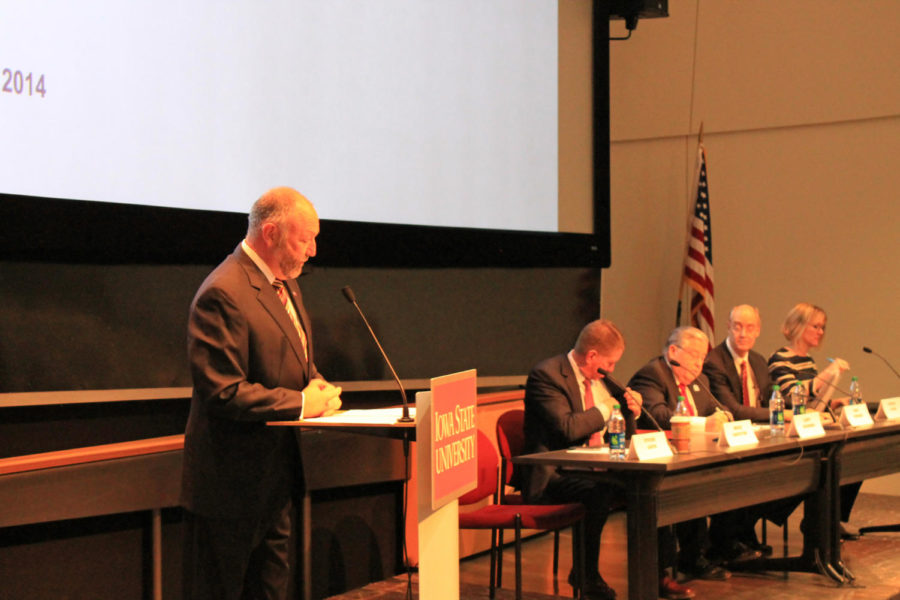Regents, Deloitte review student debt, efficiency at public forum
April 1, 2014
Iowa’s three regent universities are under review in hopes of finding ways to become more efficient.
Iowa State held its public forum on the Iowa Board of Regents Transparent, Inclusive Efficiency Review Tuesday morning.
The efficiency review, sometimes referred to as TIER, is a review that will look at the processes, programs and spending of all three regent universities — Iowa State, University of Iowa and University of Northern Iowa.
The Board of Regents has hired Deloitte Consulting to conduct the review.
“We owe it to our students, to their parents, to the taxpayers of Iowa to be sure we operate as efficiently as possible going forward,” said Steven Leath, ISU president.
The objectives of the review are to identify new ideas for investing public resources, looking at both administrative and academic programs and recognizing strengths, as well as possible areas of improvement at each university.
Board of Regents President Bruce Rastetter said all savings found in the review will stay at each university.
Increasing tuition rates and decreasing support from the state were among highlighted topics.
Rastetter said tuition is increasing while support from the state is decreasing. The average amount of debt for an ISU graduate is $29,324. Iowa is ranked sixth highest in the nation for student debt.
“That, to me, is unacceptable,” said Regent Larry McKibben, chair of the efficiency committee for the board. “Three out of four students are graduating with debt.”
McKibben said a $29,324 debt load, with a $350 per month repayment plan, would be paid off by May 1, 2023 after 109 payments.
The last time an efficiency study like this was done was about 30 years ago, Rastetter said. At that time, general education funding was about 70 percent from the state and about 30 percent from tuition. Those numbers have swapped spots, Rastetter said.
Rastetter said for the past two years, the regents have been trying to change this number by asking for an increase in appropriations in order to provide a resident undergraduate tuition freeze.
This request for an increase in state appropriations was granted last year and is still in the legislature for a four percent increase in state appropriations for the next school year.
A question and answer session was held after the presentation. Questions came from audience members who wrote questions on a piece of paper before the meeting and were read off by Miles Lackey, associate vice president and Iowa State’s representative to the review committee.
An audience member asked about program duplication among the universities, and if a program cut might result in loss of faculty or staff.
Rick Ferraro, representative from Deloitte and general manager of the review, said they do not have an immediate answer, but that Deloitte will look at each university’s core mission. Ferraro said they will look at programs to see if they are essential to the universities’ core missions and if they cover their own costs, but there is no set of pre-determined criteria for cutting a program.
“The challenge here is: let’s define what the next tier of performance can be and let’s move towards that,” Ferraro said. “That’s what this project is fundamentally about.”
Rastetter said he would like to see a policy come out of this study that would help future regent boards in creating new programs at universities to avoid program duplication.
Deloitte is in phase one of the three-phase review, which is collecting data on university budgets, spending on goods and services, policies, procedures, organizational charts, service areas, annual reports and technology systems, said Virginia Fraser, representative from Deloitte who will be the day-to-day manager of the project.
“We are simply identifying possible opportunities and not doing anything, not recommending anything,” Ferraro said.
Phase two will be an interview phase with each university’s faculty, staff, president, provost, student services, advertising and marketing departments and students.
Deloitte is scheduled to be on campus the week of April 14 for meetings. The schedule for the interviews is not yet finalized.
John McCarroll with university relations said there were about 150 attendees to the public forum. Most of the audience was staff, with some faculty members.
The public forum will be available online at the university’s efficiency homepage: web.iastate.edu/efficiency







